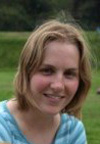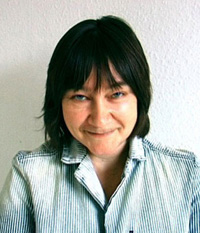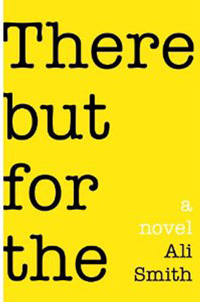
At the centre of Ali Smith's new novel is a locked room. In the middle of Genevieve and Eric Lee's dinner party, their guest Miles excuses himself from the table, shuts himself in the Lees' spare room, and quietly refuses to leave. Anna Hardie, briefly an acquaintance of Miles as a teenager but long out of touch with him, finds herself summoned to persuade him, through the closed door, to come out. This is just There But For The's jumping-off point, though, a pretext for a wild and exhilarating exploration of the nature of identity, language, art and story.
The premise is, superficially, similar to that of Smith's 2005 novel The Accidental, in which an alien invasion, an outside agent is inserted into an otherwise "normal" home to create mischief. Where The Accidental's Amber was deliberately provocative, though, Miles's residence in Gen and Eric's "gracious old historic Greenwich town house" is quiet and understated—the chaos resides primarily in the reactions he provokes. The novel interrogates, and has a lot of fun with, the Joycean concept of absence as the "highest form of presence". Miles removes himself from the world, and by doing so, creates a space into which the rest of the characters project themselves, their views of the world, and their own sense of meaning and belief.
What things "really mean", versus what they stand for, is a central concern of There But For The. Gen Lee's house, with its “contemporary chic lounge [like one] in a theatre performance”, is crammed with delightful objets whose names are more important than their substance: the Robin Day chair, the Scottish river pebbles, the roof beam that is "believed to be part of a ship which had fought at Trafalgar", the "believed 18th century" door of the room in which Miles has locked himself. Even Gen's dinner guests stand for something; to her, they are labels rather than the people behind them, cast in their roles mainly to run through the same conversations that have been repeated endlessly at previous parties.
This preoccupation with signifier over signified is not limited to physical objects. Smith is also interested in what our cultural obsession with the visual, and with observation, is doing to the way we think and behave. At dinner, the clueless Hannah, rapturous over a gorgeous piece of wildlife photography, enthuses, "we don't and won't need to see a real tiger ever again now, not now that we've got images like that, not really." Mark, who brought Miles to the Lees' dinner party in the first place, muses over films of his dead partner, "there is something heartbreaking about video's inferior quality… the way it makes what happened so much less." Just as the novel probes the modern obsession with image, it also turns a critical eye on our desire to impose a narrative on the events in our lives. Miles's occupation generates a media circus…a newspaper column, a play, a protest site, slogans, merchandise…whose enthusiasm for making him stand for something extends to widespread adopting of the name-change Gen Lee used in her initial column, because “Milo's got something about it… it's catchier".
There But For The is rich with literary allusion. Everyone does strange jobs for vague, officialese-titled unreal places, recalling the opaque bureaucracy of The Trial (Miles's nickname for Anna, "Anna K", evokes Kafka's Joseph). Smith gives May, an old lady whose past connection to Miles is gradually and sensitively revealed, an internal monologue strongly reminiscent of Winnie in Beckett's Happy Days. Brooke, meanwhile, finds her touchstones in Hamlet: the Dane's "words, words, words" is a common refrain.
This all makes Smith's novel sound very serious and worthy, but as well as being a book crammed with big ideas, it's also playful, subversive and very funny. Mark's (dead) visual-artist mother whispers scurrilous rhyming couplets in his ear; Miles, Anna and Brooke's parents have enormous fun with puns; and the pivotal scene of the Lees' dinner party is a brilliant comic set piece, pitting the small-minded suburbanites against the culturally aware.
The culturally aware—the Bayoudes, Anna, Miles, Mark—as Smith shows us, are more concerned with what is "really there" behind the words and pictures, something that manifests itself in those characters' freedom in language, an ability to play with it and transcend it. There But For The is overflowing with an exuberant joy in wordplay—-puns, allusions, double meanings, spelling mistakes, anagrams—frolicking in the mutability and slipperiness of language. Smith's main characters yearn to return to "a time before weapons sales initiatives were called things like Peace". They are only too happy to spend time explaining and defining words for 9-year-old linguaphile-in-training Brooke; for example, 'ostensibly', which Anna explains to Brooke as "what things look like on the outside. Ostensibly, my job meant one thing, but really it meant another."
There But For The wants us to reclaim and celebrate language, but also to respect it, to pay attention to the important work that even the smallest of words does in our efforts to communicate. As Miles comments, describing his thoughts on the word 'but', Ali Smith's absorbing novel "always takes you off to the side, and where it takes you is always interesting".
 Rachael Beale has spent much of her career to date experimenting with combinations of words and technology, either writing for
technical companies, or doing technical things for literary ones. She graduated from the University of Cambridge's Trinity
College with an M.A. allegedly in "English Literature;" actual English writers account for quite a small proportion of her
reading, which tends to sprawl luxuriously across genre boundaries. She makes time to read and talk about books by not doing
things that normal people consider essential (sleeping, cleaning, ironing...)
Rachael Beale has spent much of her career to date experimenting with combinations of words and technology, either writing for
technical companies, or doing technical things for literary ones. She graduated from the University of Cambridge's Trinity
College with an M.A. allegedly in "English Literature;" actual English writers account for quite a small proportion of her
reading, which tends to sprawl luxuriously across genre boundaries. She makes time to read and talk about books by not doing
things that normal people consider essential (sleeping, cleaning, ironing...)

ALI SMITH is the author of the novels Hotel World—short-listed for both the Booker Prize and the Orange Prize—and The Accidental, which won the Whitbread Award and was short-listed for the Man Booker Prize and the Orange Prize. She is also the author of several short-story collections. She lives in Cambridge, England
Hamish Hamilton, hardcover, 9780241144541

Pantheon (US), hardcover, 9780375424091 (September)